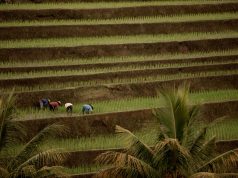
A farmer from Nueva Ecija lamented his loss after Typhoon “Karding” (International name: Noru) destroyed their rice field.
“Hindi maganda ang umaga ngayon, dito sa Laur, sobrang damage ng bagyo dito sa aming palayan, kahit saan ka tumingin dapa,” Felix Pangibitan said on Monday, September 26.
“Expected ko na yung pagdapa niya kasi malalaking palay ‘to e. Pati magiging yield nito mga 60% (to) 70% mawawala,” Pangibitan continued.
“Ganoon ang buhay e, ang pagsasaka walang kasiguraduhan, nakadepende sa panahon,” the farmer said in dismay.
“Kahapon ang gandang tingnan ‘di ba, nakatayo, at least may souvenir na ‘ko sa magandang katayuan niya kahapon,” he said, referring to the video he posted on Sunday morning, before the typhoon battered Luzon.
Pangibitan took the video on Sunday because he was unsure if his rice field would stand the bad weather condition.
“Sayang, ang ganda ng palay, vinideo ko na nga kasi bukas hindi ako sigurado kung mananatili ba ‘tong nakatayo, maghapon hanggang gabi,” Pangibitan said on Sunday.
“E ganoon talaga, kung ano nasa kalooban ng Diyos yun ang mangyayari ‘di ba pero sayang—ang hirap talagang maging farmer,” the farmer said.
Climate change
The Philippines is ranked among the most vulnerable nations to the impacts of climate change, despite contributing only 0.3% of the world’s total greenhouse gas.
The country is hit by an average of 20 storms every year.
Scientists warn that storms are becoming more powerful as the world continues to get warmer because of human-induced temperature change.
The climate hazards have caused P506.1 billion in losses and damage in the country for more than a decade, the Department of Finance said based on a Business World report in 2021.
“Located in the typhoon belt and the Pacific Ring of Fire, the Philippines constantly experiences unavoidable losses and damage amounting to 0.5% of its annual GDP primarily from an increasingly unpredictable climate,” the agency said.









